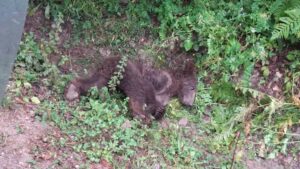A brown bear cub that was lost and thought to have become drunk from consuming too much ‘mad honey’ was rescued in the Duzce district of northwest Turkey.
Following its rescue from the jungle, footage captured the female bear trembling and moaning as she sat belly-up in the back of a pick-up truck. The only site in the world except for the foothills of the Himalayas where native species of rhododendrons create a potent neurotoxin called grayanotoxin is the Kaçkar highlands above the Black Sea, where beekeepers manufacture mad honey or ‘deli bal’ in Turkish.
If bees drink enough rhododendron nectar, their mud-red honey will have a harsh aroma, a bitter flavor, and, potentially, a high for animal consumers. A little spoonful is all that is required to produce a mildly hallucinating or euphoric mood when consumed with hot water or boiled milk. As a traditional treatment for hypertension, impotence, and several other ailments, it is typically taken before breakfast. The Ottomans exported it to Europe where it was known as ‘miel fou’ and was added to ale to increase the buzz.

Mad honey generally has a considerably higher value than conventional honey. This is partially due to the widespread perception that mad honey is more beneficial to health than conventional honey. The research on the health advantages of hallucinogenic honey from Nepal and Turkey is uncertain, yet people use it to cure ailments including hypertension, diabetes, arthritis, and sore throat in the Black Sea region and elsewhere.
Islamabad Zoo’s Brown Bear Suzie succumbs to cancer in Jordan
However, too much can result in dangerously low blood pressure, dizziness, nausea, seizures, arrhythmia, and, in rare instances, death. Turkey sees dozens of hospitalizations for mad honey poisoning each year. The injured bear was taken to a veterinarian, where she received treatment. The animal will likely be returned to the wild in the upcoming days, according to officials, who stated that it was in good shape. Through Twitter, Turkey’s agriculture ministry urged people to name the bear.

Even though it only makes up a small portion of the country’s overall honey production, beekeepers in Nepal and Turkey still harvest mad honey today. Mad honey is allowed to produce, sell, and exported in both countries, but it is prohibited in some other countries, including South Korea, which outlawed it in 2005. While interested purchasers in the United States can acquire mad honey from nations such as Turkey and Nepal, it might be best to stick with the conventional stuff. After all, the few experiences listed on the website of the non-profit organization dedicated to the psychedelic study, Erowid.org, don’t sound all that appealing.
- Misleading Video Alters Prime Minister Shehbaz’s Speech Targeting Political Rival, Not His Party - 21/04/2024
- ATC Grants Three-Day Remand for Suspects in Ichhra Bazaar Harassment Case - 19/03/2024
- Pakistan, India, and Bangladesh Lead World in Severe Smog Crisis, Exceeding WHO Guidelines - 19/03/2024


